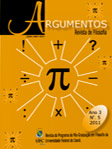Fundacionalismo: da tradição às teorias moderadas
DOI:
https://doi.org/10.36517/arf.v3i5.18990Palavras-chave:
Justificação. Fundacionalismo. Infalibilismo. Falibilismo.Resumo
Historicamente a epistemologia tem definido conhecimento como universal e infalível, mas a tradição não deu conta de resolver de forma suficientemente satisfatória as questões colocadas pelos céticos, tais como o questionamento da existência do mundo externo à mente, o argumento da ilusão e do erro, entre outros. Diante disso, reformulações no conceito de conhecimento têm sido admitidas, dando origem a novas abordagens em Epistemologia. Entre as novas abordagens propostas estão as teorias falibilistas, que defendem o conhecimento como falível e nossas crenças anuláveis e revisáveis. O presente trabalho tem por objetivo explicitar a teoria da justificação fundacionalista, tanto na sua origem, com as propostas infalibilistas, quanto as posteriores reformulações. O fundacionalismo foi uma das primeiras alternativas ao problema da justificação de crenças, mas sua proposta de deter o regresso epistêmico com crenças básicas infalíveis deu origem a uma série de objeções céticas. Em decorrência disto, um enfraquecimento desta teoria foi formulado, a saber, as teorias falibilistas, que defendem que o conhecimento não é universal e irrevogável, mas que pode ser revisto e aperfeiçoado. Na primeira parte do trabalho, apresentaremos a questão da justificação epistêmica e o problema do regresso de razões. Em um segundo momento, explicitaremos o fundacionalismo tradicional, a maneira como este concebeu o regresso epistêmico, bem como às objeções a ele apresentadas. E por fim, apresentaremos as formulações falibilistas e como estas tentam dar conta dos problemas deixados pela tradição. Este trabalho pretende mostrar que o falibilismo corresponde a uma nova forma de compreender o conhecimento em epistemologia e, para tal, reformula conceitoscomo o de infalibilidade e universalidade.
Downloads
Downloads
Publicado
Edição
Seção
Licença
Autores que publicam nesta revista concordam com os seguintes termos (SOBRE COPYRIGHT E POLÍTICA DE ACESSO LIVRE):
1. Autores mantém OS DIREITOS AUTORAIS concedidos à revista OU Direito de Primeira Publicação, com o trabalho simultaneamente licenciado à Atribuição de Licença Creative Commons (CC BY) que permite o compartilhamento dos trabalhos com reconhecimento de autoria e publicação inicial nesta revista.
2. Autores têm permissão para aceitar contratos, distribuição não-exclusiva da versão do trabalho publicada nesta revista (por exemplo: publicar no repositório institucional ou como um capítulo do livro), com reconhecimento de autoria e publicação inicial nesta revista.
3. Autores têm permissão e são estimulados a publicar e distribuir seu trabalho on-line (por exemplo: em repositórios institucionais ou em sua página pessoal) mesmo durante o processo editorial, haja visto que isso pode aumentar o impacto e citação do trabalho publicado.




.jpg)










._._3.png)
1.jpg)
._._._.png)
